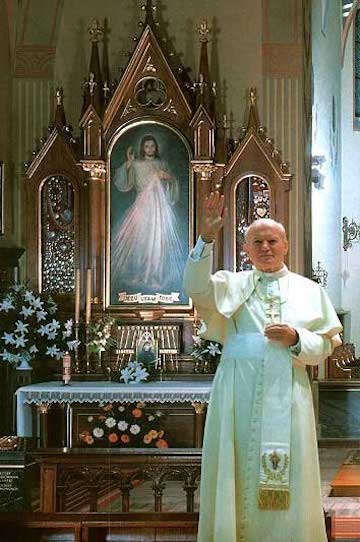On October 2, 1978, I found myself amidst a joyous throng on Boston Common awaiting the arrival of Pope John Paul II, who celebrated Mass in the rain that afternoon. He preached on the gospel of the rich young man who went away sad after he refused to answer the Lord’s call to sell what he had and come follow Him.
I was with a group from my college chaplaincy, which had traveled three hours by bus to Boston. I look back on that day with great fondness. It was my senior year. I applied to the seminary not long afterwards. I’d decided on the priesthood the year before. The pope’s visit strengthened my resolve, especially the prospect of serving Christ’s Church as a priest under the guiding hand of such a strong and vibrant shepherd.
It is refreshing to think back on what the election of John Paul II meant for the Church as he is elevated to the altars this Divine Mercy Sunday 2014, a feast he himself placed on the Roman Calendar. His life was shaped by his deep faith, tested sorely by the great trials of the twentieth century.
He lived under the two large ideological tyrannies of his day: National Socialism and Communism. Both forms of atheism violated his country, and he fought back with the sure knowledge that truth is more powerful than lies. He was a man who believed in Providence and knew he was a living instrument in the hands of the Lord.
The Church underwent numerous convulsions in 1978. John Paul II restored stability and doctrinal sanity. He represented the timeless Faith, which had been assailed by organized efforts to cast aside essential teachings and previously unquestioned ways of living.
His devotion to Our Lady was shocking to misguided ecclesiastics who discouraged all forms of traditional piety. Poland had been spared much of the controversy and chaos after the Second Vatican Council – because of the oppression of the Church by the communist government.
That oppression meant that the newly elected John Paul II was a veteran at defending both Catholic teaching and the right to live out the faith, free from coercion and violence. That Faith also needed defending from the secularizing West and its apologists among the Catholic intelligentsia.
As a seminarian and then young priest, I felt great confidence in God’s guiding hand as John Paul, without apology, proclaimed Church teachings, both then and over his entire pontificate.

Think of Familiaris Consortio, Reconciliatio et Paenitentia, Veritatis Splendor, Evangelium Vitae. One particular gift he gave the Church is the Catechism of the Catholic Church, a sure reference. It remains absolutely fundamental for confronting the spirit of our age with beautiful, timeless Catholic truth.
Part of John Paul II’s achievement was his persistent refusal to treat the status quo as something that had to be accommodated. Christ did not come into the world merely to suggest that we might want to think about hearing him out. Christ called everyone to radical conversion of mind and heart.
So did John Paul II – when he called upon the people of his native Poland to be true to their Faith and to the history of God’s providence in preserving the Polish people as faithful, and therefore free, followers of Christ. His message to the Communist oppressors was clear, and they knew it was coming from the moment il polacco stepped out onto the balcony of St. Peter’s: God made man to freely serve Him, and any political arrangement that sought to prevent that was unjust – and had to go.
That same message was spoken in January 1998 when John Paul II visited Cuba. I had the privilege of being in Havana and listening to the Cubans assembled for Mass in Revolution Square chanting: “The pope wants us to be free!”
From my position among the concelebrating priests, I saw Fidel Castro and his entourage sitting silently while the pope and the Cuban people spoke the truth in love. Fidel might have felt he was trapped in these, for him, novel circumstances. But he was in fact hearing the voice of the Lord calling him to repent. He still has time to do so.
The pope knew that the deepest human desire can only be satisfied by Christ. Dictators of all sorts may be able to enslave and kill the people they claim to be liberating; John Paul II roamed the world proclaiming that there is relief and true liberation only in Christ. That day in Cuba, he ad-libbed from the altar, “The Spirit blows where it wills.”
That is how he conceived what was going on that day, and every day. God is the actor, we are cooperating parties. Our share in this drama can only be understood and embraced if we know that our cooperation with God is worth every sacrifice, because it unites us to Christ and gives meaning to everything. Apart from Him, nothing makes sense and we wander.
John Paul II’s canonization reminds us that God has not left us orphans in a hostile world. Rather, we are a flock well guided by saints, some of our own era, who boldly brought Christ to the world. That boldness included teaching with precision the doctrine of the Faith in an age that often rejects the very idea of truth. Their very lives teach that being a good and faithful servant of the Lord produces immense spiritual benefits.
We have all been touched by the life and works of this newest saint, and we must thank the Lord for giving us such a remarkable shepherd, who now intercedes for us from our true home in Heaven.
















